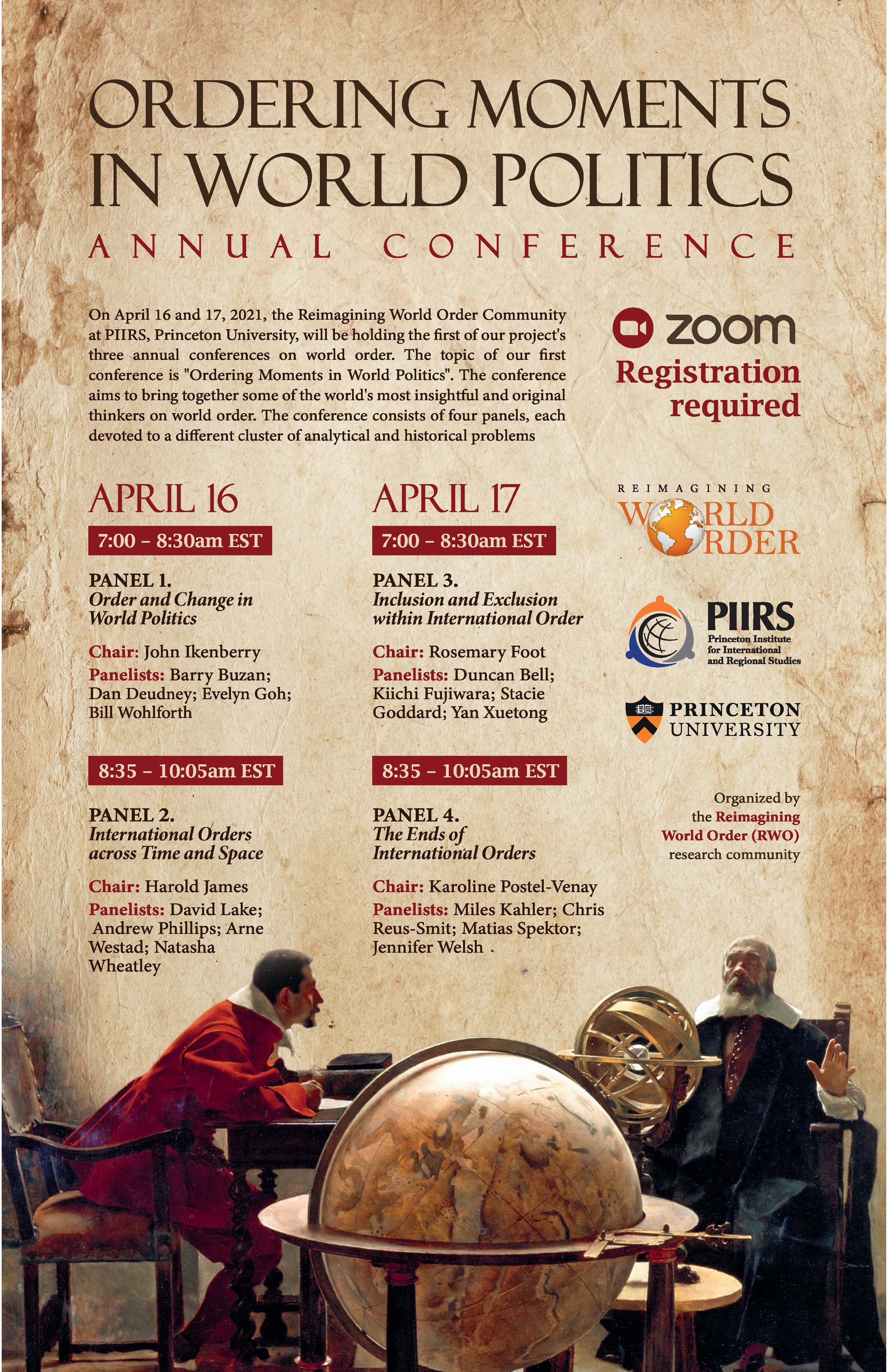
The RWO Community is pleased to announce that the first of our three annual conferences on world order will be held on April 16-17, 2021. Please note that advance registration is required. You can register HERE.
The first panel, entitled "Order and Change in World Politics", will explore why and how international orders rise and fall. Within the field of international relations, Robert Gilpin’s War and Change in World Politics (1981) has long provided a springboard for scholarly debates on the logic of the emergence and change of international orders. Gilpin’s realist framework identifies differential growth in the national power of leading states relative to the established architectures of order and hierarchy of prestige as the primary motor of international change. Is Gilpin’s seminal analysis still useful? And does the idea of ‘ordering moments’ provide a fruitful way of thinking about international order? This panel invites scholars of IR and international history to engage in a conversation with Gilpin and with one another to offer their perspectives on how orders are forged, whether it is sensible to speak of orders being constructed at critical junctures, what underlying causal or hermeneutic logics international orders are intended to negotiate, and what world-historical processes alternatively reinforce and undermine international orders. This panel will be chaired by our Director, G. John Ikenberry, and feature Barry Buzan, Daniel Deudney, Evelyn Goh, and William Wohlforth.
The second panel, entitled "International Orders Across Space and Time", will explore why some international orders have proven more resilient than others. Scholars often distinguish between ‘modern’ and ‘early-/pre-modern’ international orders, yet viewing the past from the perspective of the present also reveals continuities or recurrences in political behaviors, themes, and challenges. What distinguishes the modern international order from what came before, and what concepts or instruments of order-building from the more distant past might be valuable tools today? These fundamental questions implicate both causal and hermeneutical investigations. On the causal side, we may enquire, for example, how the toolkit of international cooperation and the diversity of the modern international system’s institutional ecosystem differ, or are similar to, its pre-modern predecessors. We could further ask what theoretical or historical models are helpful in accounting for those differences and similarities? On the hermeneutical side, we may consider whether there are any salient differences in the normative purposes of the modern and pre-modern orders. This panel brings together IR scholars and historians to engage in a comparative assessment of the varieties of international orders that have existed historically and across continents. This panel will be chaired by Harold James and feature David Lake, Andrew Phillips, Arne Westad, and Natasha Wheatley.
The third panel, entitled "Inclusion and Exclusion Within International Order", will explore how the boundaries of international orders are drawn. Some scholars have shed critical light on exclusionary ideologies of race and civilization that underpinned European imperialism and their ongoing legacies. Others have turned to past regional orders to explore the variety of ways in which differences of ethnicity, religion and culture have been managed. Issues of inclusion and exclusion are also salient to the postwar liberal international order, especially with respect to the role of open access principles and institutions; significant, too, are the ways in which postcolonial states and rising powers have contested the rules of the system in the name of social justice or civilizational plurality. This panel aims to examine the logic and practice of inclusion and exclusion within international orders from a variety of disciplinary and geographical standpoints. Can there be order without inclusion or exclusion? What principles of inclusion and exclusion have, historically, been invoked to delineate the boundaries of international orders? In what ways has the actual practice of engagement and disengagement followed those legitimizing principles and in what ways did it depart from them? What causal or hermeneutical explanations are useful in accounting for those outcomes? Finally, are there any systemic differences, on these points, between pre-modern and modern international orders? The third panel will be chaired by Rosemary Foot and feature Duncan Bell, Kiichi Fujiwara, Stacie Goddard, and Yan Xuetong.
The fourth panel, entitled "The Ends of International Orders", will explore the purposes that international orders serve. Are there any discernible trends in the variability of those purposes across time? In particular, is it meaningful to speak of progress in the practice of international order – whether across the entirety of recorded history or within a salient period, such as industrial or post-industrial modernity? One heuristic that is commonly invoked in discussions of these questions is the dichotomy of pluralism and solidarism. Bringing this dichotomy to bear on our enquiries, we could further ask whether pluralist orders, which aim to preserve the minimal conditions for peaceful coexistence between states aiming at potentially divergent normative purposes, are more or less stable than solidarist orders, which aim to enact and manifest a normative consensus among the constituent states. This panel invites scholars to consider the ends of international orders from theoretical, both causal and hermeneutical, and historical standpoints. The fourth panel will be chaired by Karoline Postel-Venay and feature Miles Kahler, Christian Reus-Smit, Matias Spektor, and Jennifer Welsh.


